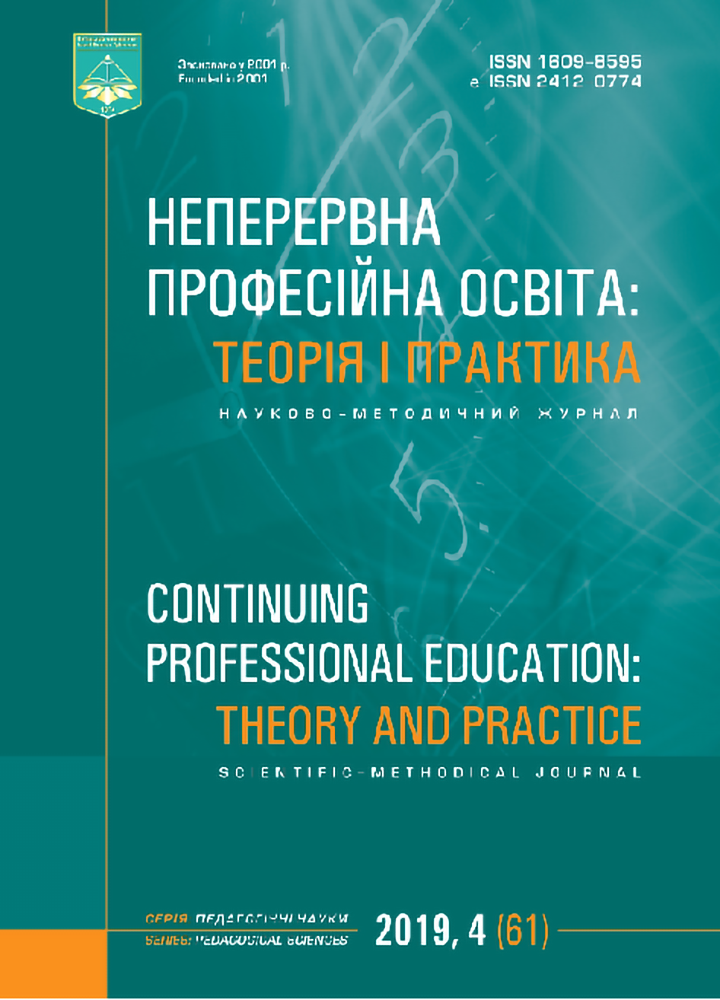FORMING STUDENTS’ READINESS TO INTERCULTURAL COMMUNICATION IN TOURISM SPHERE: MAIN APPROACHES
DOI:
https://doi.org/10.28925/1609-8595.2019.4.6267Keywords:
dialogizing, intercultural communication, modeling, tourism sphere, students’ readiness to intercultural communicationAbstract
The article analyzes the main approaches to forming students’ readiness for intercultural communication in the tourism sphere, including: individual approach to students; problematic and creative nature of foreign language tasks; use of modern innovative learning technologies; dialogue of the learning process; modeling of professional communicative situations. The concept of «student’s readiness for intercultural communication» is considered as an integrative professional characteristic of the individual, which determines the level of professionalism of the future specialist in his or her foreign language communicative competence and includes needs, motives, psychological qualities, subject and intellectual knowledge, skills and skills to perform professional tasks. It is concluded that foreign language is an important tool for intercultural communication and at the same time a special mechanism of effective cooperation, since it influences the process of formation of professional qualifications and competencies of future specialists in tourism industry, which ensures their competitiveness in the labor market and guarantees employment in the specialty.References
Amosov, N. M. (1968). Modelirovanie slozhnyih sistem [Modeling complex systems]. Kyiv, Ukraine: Naukova Dumka (rus).
Ananieva, L. V. (2002). Navchannia studentiv movnykh spetsialnostei profesiino spriamovanoho dialohichnoho movlennia z vykorystanniam dilovoi hry (frantsuzka mova) [Teaching students of language specialties of professionally directed dialogic speech using a business game (French)]. Extended abstract of candidate’s thesis. Kyiv, Ukraine (ukr).
Vergasov, V. M. (1985). Aktivizatsiya poznavalnoy deyatelnosti studentov v vyisshey shkole [Intensification of cognitive activity of students in higher education]. Kyiv, Ukraine: Vyisshaya shkola (rus).
Verlan, A. F., & Tverezovska, N. T. (1998). Dydaktychni pryntsypy v umovakh tradytsiinoho i kompiuternoho navchannia [Didactic principles in traditional and computer-based teaching]. Pedagogy and Psychology, 3, 126– 132 (ukr).
Halytska, M., & Rekun, N. (2018). Polivariantnist rolej vikladacha inozemnoyi movi dlya profesijnih tsilej [Polyvariance of the teaching roles within the ESP course]. The Pedagogical Process: Theory and Practice, 4 (63), 57–63. DOI: 10.28925/2078-1687.2018.4.5763 (ukr).
Gershunsky, B. S. (1987). Kompyuterizatsiya v sfere obrazovaniya: problemyi i perspektivyi [Computerization in the field of education: problems and prospects]. Moscow, Russia: Pedagogika (rus).
Hnatkevych, Yu. V. (1999). Navchannia leksychnoho aspektu chuzhozemnoi movy u vyshchykh navchalnykh zakladakh [Learning the lexical aspect of a foreign language in higher education]. Kyiv, Ukraine (ukr).
Zahalnoievropeiski Rekomendatsii z movnoi osvity: vyvchennia, vykladannia, otsiniuvannia [Pan-European Language Education Guidelines: Study, Teaching, Assessment] (2003). S. Yu. Nikolaieva (Ed.). Kyiv, Ukraine: Lenvit (ukr).
Metodyka vykladannia inozemnykh mov u serednikh navchalnykh zakladakh [Methods of teaching foreign languages in secondary schools]. (2002). S. Iu. Nikolaieva (Ed.). Kyiv, Ukraine: Lenvit (ukr).
Osnovy novykh informatsiinykh tekhnolohii navchannia [Fundamentals of New Learning Information Technologies]. (1997). Yu. I. Mashbyts (Ed.). Kyiv, Ukraine: IZMN (ukr).
Uznadze, D. N. (1976). Ustanovka u cheloveka [Installation in humans]. Hrestomatiya po vnimaniyu. Moscow, Russia: Prosveschenie (rus).
Fastovets, R. V. Upravlenie inoyazyichnyim obscheniem v uchebnyih usloviyah [Management of foreign language communication in a teaching environment]. In A. A. Leontiev (Ed.), General methodology of teaching foreign languages: anthology (pp. 187–194). Moscow, Russia: Russkiy yazyik (rus).
Mazaraki, A., Boiko, M., Bosovska, M., Vedmid, N., & Okhrimenko, A. (2018). Formation of the national tourism system of Ukraine. Problems and Perspectives in Management, 16 (1), 68–84. DOI:10.21511/ppm.16(1).2018.07 (eng).
Mariani, L. (1992). Language Awareness/Learning Awareness in a Communicative Approach: a key to learner independence. Perspectives, a Journal of TESOL-Italy, Volume XVIII, Number 2, December (eng).
Downloads
Published
How to Cite
Issue
Section
License
Copyright (c) 2020 Màiia Hàlytska, Nataliia Rekun

This work is licensed under a Creative Commons Attribution-NonCommercial 3.0 Unported License.



